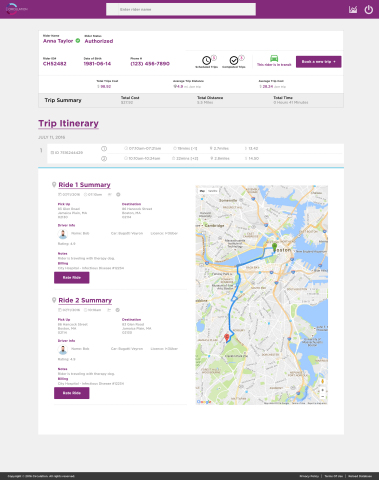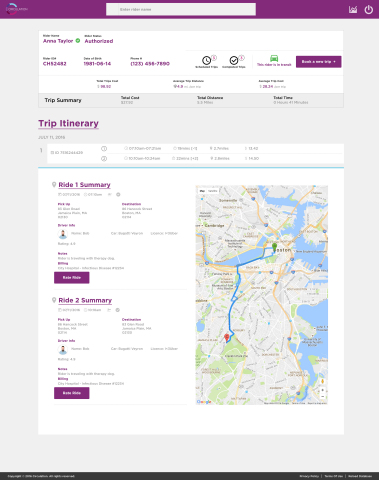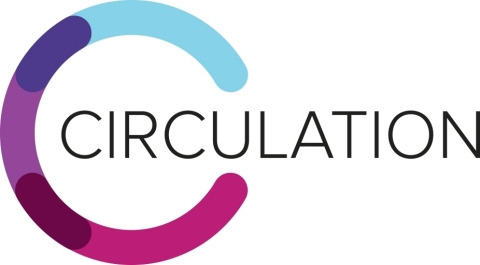BOSTON, Mass.--(BUSINESS WIRE)--Circulation today launched with the first customizable, patient-centric digital transportation platform that seamlessly integrates with both healthcare systems and Uber’s API. This unique integration marks a significant step forward in providing reliable non-emergency medical transportation. Additionally, Circulation has been chosen as the Preferred Healthcare Platform Partner of the Uber Developer Platform.
Initially piloting at Boston Children’s Hospital, Mercy Health System’s three acute-care hospitals and all-inclusive care program for the elderly in Pennsylvania, and Nemours Children’s Health System in Wilmington, Delaware, Circulation’s service is expected to roll out across six additional states in 2016.
“The traditional healthcare transportation model is severely outdated,” said John Brownstein, Ph.D., co-founder of Circulation. “Every patient’s experience begins and ends with their ride, which is why the integration of Uber and Circulation offers a smart, digital transportation platform for healthcare that customizes rides around patients’ specific needs and ensures they get the care they deserve.”
HIPAA-compliant to protect patient info
In contrast to other
non-emergency medical transportation options, Circulation is more than a
ride. It is a one-stop, centralized portal that customizes rides around
patients’ healthcare needs and preferences. The Circulation platform is
secure and compliant with the Health Insurance Portability and
Accountability Act (HIPAA) to protect the privacy and security of
patient health information.
By incorporating a deep level of integration with existing healthcare information systems and Uber, Circulation provides patients, caregivers and hospital staff a seamless, superior overall experience. Hospital transportation coordinators can schedule and manage on-demand rides that are affordable and tailored around patients – all from one convenient interface. Coordinators can update patient information files with transportation scheduling information, ensure physicians, nurses and caregivers are notified when patients arrive for appointments, and receive alerts on Circulation’s centralized multi-patient dashboard – all in real-time.
"We’re very proud of this integration and thrilled to call Circulation our Preferred Healthcare Platform Partner,” said Meghan Joyce, East Coast Regional General Manager at Uber. "Circulation is unique in that it seamlessly connects healthcare information systems to a dependable, low-cost, end-to-end platform that simplifies and improves patient transportation logistics. Through Circulation, hospitals now have a viable option for modernizing their non-emergency medical transportation and can easily request an Uber when they need one.”
Growing hospital demand
Cited in this month’s Journal
of the American Medical Association as a solution to the growing
challenges in non-emergency medical transportation, Circulation is
designed to help improve health outcomes for the estimated 3.6 million
Americans (including almost one million children) who miss medical
appointments each year due to transportation issues.
“We are confident that Circulation will help us improve access and patient-centered care to acute care and elderly patients across Southeastern Pennsylvania who need help getting to their medical appointments,” said Gary Zimmer, Senior Vice President and CEO, Clinically Integrated Network at Mercy Health System. "Unlike other new offerings that are stand-alone systems to dispatch on-demand vehicles, Circulation's platform integrates with our internal systems, as well as with ride providers like Uber. It’s much more efficient for our transportation coordinators and allows us to seamlessly orchestrate the ride into the overall patient experience."
“There’s already much stress and anxiety on the part of families whose young children need regular medical care,” said Dr. Michael Docktor, Pediatric Gastroenterologist at Boston Children’s Hospital. “With Circulation, we can alleviate the added headaches that come along with traffic and parking challenges in a busy city such as Boston and ensure that parents can focus on their children – not the ride to the hospital.”
Ed Woomer, LCSW, Administrator, Patient & Family Services at Nemours Alfred I. duPont Hospital for Children in Wilmington, Delaware said, “We’re excited to be participating in the next evolution of on-demand healthcare transportation with Circulation to provide more reliable, timely and predictable routine healthcare transportation to our young patients and their families. We have an opportunity to make a real difference for children in need of care but who live in rural areas and struggle to make appointments.”
How it works
- Circulation starts with secure login and automatic verification of customer health insurance and ride eligibility.
- Patient contact and health information is auto-populated into the system from health system records.
- Circulation enables hospitals to schedule and manage transportation around patients’ needs and preferences. Scheduling can be done as far in advance as needed and reoccurring appointments can be booked with a simple click to eliminate task duplication.
- The platform asks if patients require wheelchair assistance or help getting in/out of a vehicle; if they are hearing/vision impaired; travel with a caregiver; and other important factors to determine the best vehicle selection.
- A growing number of vehicle types are available through Circulation, including uberX and uberXL, and in some cities other options are available, such as UberACCESS.
- Ride reminders and real-time notifications can also be automatically sent to both patients and their caregivers via phone, text or email to enhance communication.
- All billing and payment reconciliation with Uber and healthcare organizations is seamlessly handled on the backend of Circulation’s system.
- To help mitigate fraud and abuse, Circulation’s utilization performance tracking functionality gives administrators the ability to set triggers and detect suspicious activity.
According to the Transportation Research Board, up to $3 billion is spent annually by Medicaid on non-emergency medical transportation. It is estimated that 33 percent of non-emergency medical transportation rides are funded inappropriately.
About Circulation
Circulation takes a multidisciplinary,
cutting-edge approach to turn better transportation into better health
outcomes and positively impact population health. The company was
co-founded by John Brownstein, PhD, a healthcare advisor to Uber,
Professor at Harvard Medical School, and Research Faculty at Boston
Children’s Hospital; Robin Heffernan, PhD, CEO of Epidemico, one of the
country's foremost population health informatics companies, and VP of
Booz Allen Hamilton; Jared Hawkins, PhD, MMSc, Faculty at Boston
Children's Hospital and Director of its Informatics Innovation Program;
and Leerom Segal, CEO and Co-founder of Klick Health, a leading
commercialization partner in the healthcare industry. Follow Circulation
on Twitter at @circulationmed.
Hospitals and other healthcare organizations interested in learning more about Circulation and joining the pilot program, please email info@circulation.co. For more information on Circulation, visit Circulation.co. For more information on the Uber API integration, go to: https://medium.com/uber-developers.




